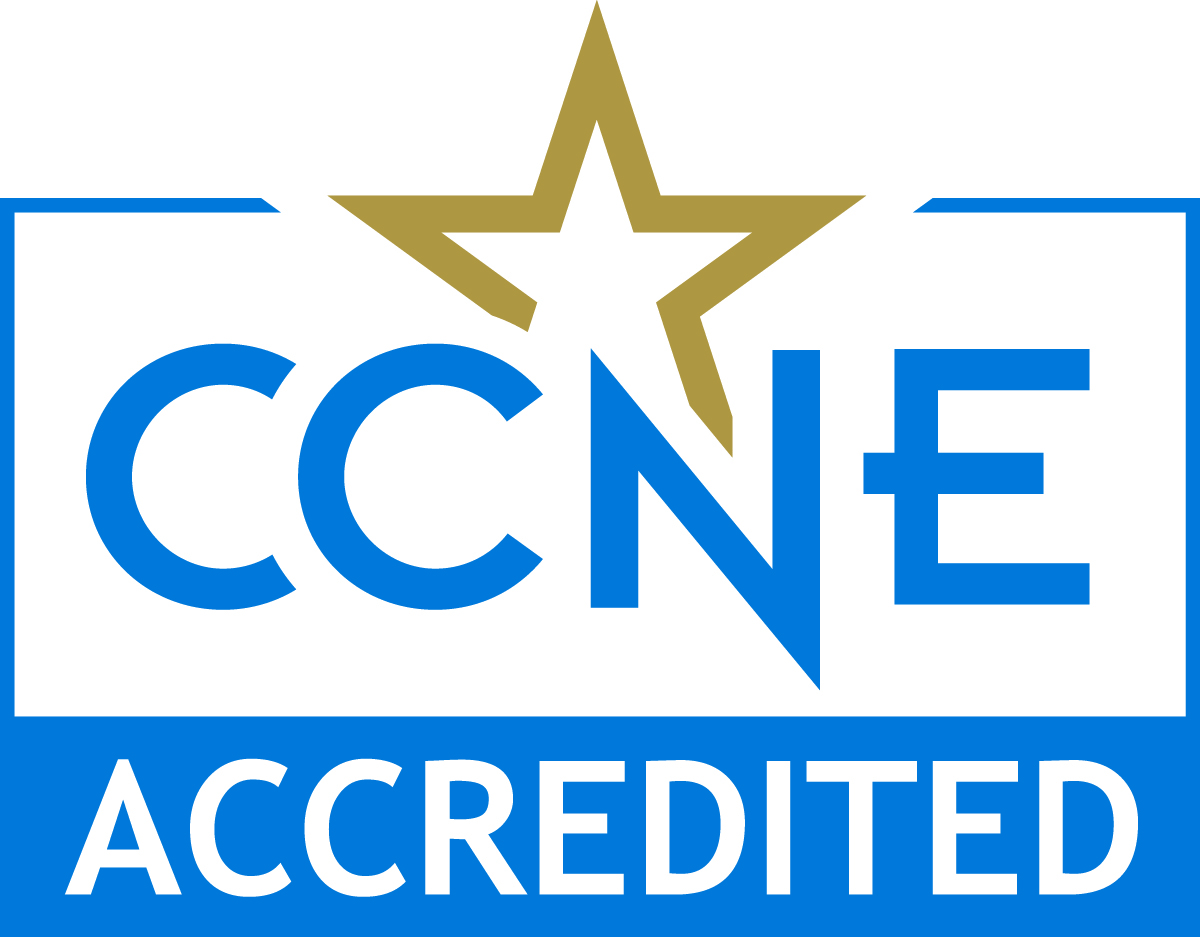MASTER OF SCIENCE IN NURSING
![]()
Accreditation
The baccalaureate degree program and the masters in nursing program at Northeastern State University is accredited by the Commission on Collegiate Nursing Education, 655 K Street NW, Suite 750, Washington, DC 20001, 202-887-6791.
Student Learning Outcomes
- Construct a partnership with healthcare colleagues and other stakeholders to optimize care, enhance the healthcare experience, and strengthen outcomes.
- Synthesize specialized knowledge and theories from nursing and other disciplines into advanced nursing practice.
- Apply expanded research knowledge, critique skills, and evidence-based practice relevant to advanced nursing practice.
- Demonstrate leadership in nursing practice to initiate change and to improve the quality, safety, and outcomes for individuals, populations, and systems.
- Analyze the social, cultural, political, legal, and ethical influences that impact nursing practice.
- Evaluate information, technology, and other resources effectively.
- Demonstrate advanced nursing practice emphasizing engagement and lifelong learning.
Options - 12 hours
Select one of the following options:
Nursing, M.S.N. - 32 hours
Core Curriculum - 20 hours
- NURS 5011 - Transition to Graduate Nursing Studies
- NURS 5123 - Theoretical Foundations
- NURS 5213 - Cultural Competency: Regional and Global Perspectives
- NURS 5253 - Policy, Ethics, and Quality in Professional Nursing Practice
- NURS 5293 - Advanced Research and Evidence Based Practice for Health Professionals
- NURS 5313 - Issues and Trends in Professional Nursing Practice
- NURS 5810 - Practicum (2 hours)
- NURS 5992 - Nursing Practice Capstone
Nursing Education Certificate
OSRHE Program Code: 169
CIP Code: 513813
Certificate Code: 7891
Master of Science in Nursing Embedded Certificate
The Nursing Education certificate program is designed for people interested in Nursing Education including nurses working in the clinical area who are in staff development or patient education or who wish to transition or enter into an academic setting. The certificate program can be completed online in less than 2 semesters. Among the topics covered are curricular design, instructional and teaching modalities, assessment and evaluation, and nurse educator role development.
Recommended steps for completing the Nursing Education Certificate:
- Evidence of current unencumbered licensure as a registered nurse
- A bachelor’s degree
Certificate program must be completed within a timeframe of two (2) years.
At least 25 percent of the coursework applied to this embedded certificate must be satisfactorily completed at NSU.
Student Learning Outcomes
- Create collaborative partnerships with health care colleagues in the role of a nurse educator.
- Utilize research to analyze the outcomes of nursing interventions and improve nursing practice and nursing pedagogy.
- Apply leadership strategies to contribute to the ongoing development of the profession of nursing and nursing education.
- Utilize theories of change to advance the profession of nursing.
- Apply strategies that recognize multicultural factors in teaching and learning.
- Analyze ethical theories and ethical decision-making in the educational setting.
- Analyze trends in healthcare and nursing education and their impact on the profession of nursing, nursing education, and the delivery of patient care.
- Integrate technology into curriculum.
- Apply theories of education and related sciences to the development and evaluation of nursing and healthcare curricula
- Facilitate learning of individuals and groups using theories of education, nursing, testing and evaluation.
- Design curriculum based on sound educational principles, theory, and research.
- Demonstrate responsibility and accountability for professional nursing practice and lifelong learning.
Nursing Informatics Certificate
OSRHE Program Code: 170
CIP Code: 513813
Certificate Code: 7892
Master of Science in Nursing Embedded Certificate
The primary goal of the Nursing Informatics Certificate is to broaden and deepen nurses’ understanding of skills and strategies for successful integration of informatics in health care facilities and institutions.
Recommended steps for completing the Nursing Informatics Certificate:
- Evidence of current unencumbered licensure as a registered nurse
- A bachelor’s degree
Certificate program must be completed within a timeframe of two (2) years
Students should take NURS 5473 Facilitating Learning for Health Professionals if they have previously earned course credit for NURS 5613 or its equivalency.
At least 25 percent of the coursework applied to this embedded certificate must be satisfactorily completed at NSU.
Student Learning Outcomes
- Create collaborative partnerships with health care colleagues in the role of an informatics nurse.
- Apply expanded research knowledge, critique skills and evidenced based practice relevant to advanced nursing practice.
- Use research, evidence based practice, quality improvement and safety methodologies in the evaluation and improvement of healthcare information systems.
- Demonstrate leadership in the professional practice of nursing informatics through the use of effective communication, interdisciplinary collaboration, and administrative skills.
- Participate at each stage within the health information systems life cycle as a leader and team member.
- Use research, evidence based practice, quality improvement and safety methodologies in the evaluation and improvement of healthcare information systems.
- Promote the use of healthcare informatics-related education for consumers and healthcare providers.
- Integrate legal, ethical, regulatory, technical, and professional standards into the development and implementation of healthcare related information systems.
- Manage information, technology, and resources effectively.
- Promote the use of healthcare informatics-related education for consumers and healthcare providers.
- Integrate knowledge, skills, and scientific findings from nursing science, computer science, information science, and cognitive science in the professional practice of nursing informatics.
Administrative Leadership in Nursing Certificate
OSRHE Program Code: 171
CIP Code: 513203
Certificate Code: 7890
Master of Science in Nursing Embedded Certificate
The primary goal of the Administrative Leadership in Nursing Certificate is to broaden and deepen nurses’ understanding of content and strategies for successful leadership in health care facilities and institutions. Among the topics covered are professional leadership development, organizational and systems management, healthcare finance and economics, and human resource management.
Recommended steps for completing the Administrative Leadership in Nursing Certificate:
- Evidence of current unencumbered licensure as a registered nurse
- A bachelor’s degree
Certificate program must be completed within a timeframe of two (2) years.
At least 25 percent of the coursework applied to this embedded certificate must be satisfactorily completed at NSU.
Student Learning Outcomes
- Create collaborative partnerships with health care colleagues in the role of a nurse administrator.
- Demonstrate communication skills and relationship building competencies to support organizational goals.
- Use an interdisciplinary approach to execute nursing administration practice.
- Integrate research and best evidence to provide quality nursing care and promote improvement in healthcare.
- Utilize systems thinking to lead and manage complex healthcare organizations.
- Provide leadership in the professional design of nursing care grounded in ethical, multicultural, and professional standards and healthcare policy.
- Demonstrate leadership in the professional community.
- Utilize financial, material, human, and environmental resources to benefit nursing divisions in complex healthcare organizations.
- Utilize information management systems to facilitate organizational decision making.
- Demonstrate competency of specialized knowledge, skills, and attitudes in administrative leadership.
- Demonstrate responsibility and accountability for professional nursing practice and lifelong learning.
Degree Available At
- Online
Starting Your NSU Journey?
Make your transition to NSU as smooth and seamless as possible.
Visit our Graduate College Checklist for more information.
Career Services
What Can I Do With A Major in Nursing?
-
Administrative Leadership in Nursing - High-level roles in healthcare settings such as director of nursing, chief nursing officer, nursing supervisors, or department manager
-
Nursing Education - Most nurse educators seek teaching jobs in community colleges, bachelor’s degree-appointing universities, and graduate schools. Other career opportunities include healthcare setting as staff development or clinical supervisor, training nurses in clinics and hospitals, community health services manager, healthcare organization educator or director, textbook editor, and more!
-
Nursing Informatics - Hospitals are the largest employer of RNs, including nurse informatics specialists. Additional nursing informatics employers include: insurance companies, academic institutions, corporate offices of healthcare systems, healthcare device manufacturers, technology vendors, health information exchange organizations, governments, consulting firms
Program Chair:

Did you Know?
- Administrative Leadership in Nursing - RNs who complete leadership courses in an MSN program learn how to manage change and empower personnel. They also have a voice in policy making. They acquire insight into contemporary influences, theories and functional strategies that relate to management, administration and organizational systems. A master's degree in nursing administration gives nurses the option of pursuing careers outside of direct patient care.
- Nursing Education - The healthcare industry needs more nurses to care for an aging population that suffers from chronic medical conditions. Accordingly, there is a growing need for nurse educators to prepare nursing students. However, there is a shortage of faculty to fill vacancies. Nurses who decide to complete a Master of Science in Nursing (MSN) program can help alleviate the problem by choosing nursing education as their specialty.
- Nursing Informatics - From electronic health records (EHRs) to medical wearables, technology and data factor into every aspect of healthcare. At Northeastern State University (NSU), the Master of Science in Nursing (MSN) in Nursing Informatics online program prepares RNs with the advanced competencies they need for leadership roles in informatics.
Program Requirements
- Bachelor's degree in Nursing OR Associate's degree AND non-nursing Bachelor's degree AND coursework of NURS courses with grade of "C" or better
- Completion of approved statistics and nursing course with grades of "C" or better
- Licenced as a Registered Nurse
- 2.5 GPA or 3.0 GPA in nursing major
Application Deadline
- Open Year Round
* Fees include: facility fee, student activity fee, infrastructure fee, cultural/scholastic lecturer fee, student ID fee, technology services fee and remedial course fee, if applicable. NSU courses taught at off campus locations or online might have additional fees assessed. These totals are tuition and fee estimations per program based on the current catalog year. Books, supplies and some fees may not be included. Visit: nusok.edu/tuition for detailed information.



